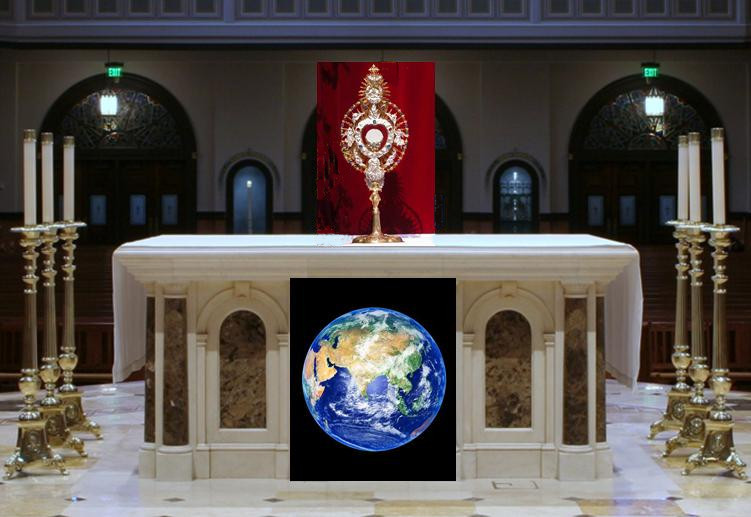|
|
|
LINK to share: https://hanglberger-manfred.de/en-transformation-of-bread-and-wine.htm Christians believe in the transformation of bread and wine
into the body and blood
of Jesus in the Eucharistic celebration. |
|
Bread and wine are "fruits of the earth" and as such represent
the whole earth and the cosmos from which the earth was created.
Bread and wine are therefore
not only symbols of the Creation, but make it a reality on the altar. At the Last Supper, Jesus said about bread and wine - and thus about the earth and the Creation: "This is my body, this
is my blood." As all the Gospels show, Jesus knows that he belongs to and is deeply connected to the earth. He says YES to human existence in this world and he agrees that everything
belongs to the great
community of nature in this world. He enjoys the lilies in the field and the birds
in the sky, he seeks the silence of nature to pray, he attends a wedding party as a
guest and enjoys being invited to dinner. His “incarnation” is not just a biological event, but a comprehensive becoming one with God's Creation and an inner bond with
every human being: At the celebration of the Eucharist, we Christians are invited to inwardly speak the words of
Jesus, "This is my body, this is my blood,"
and to existentially comprehend
their meaning. To know ourselves deeply connected to the earth, to God's Creation, and to humanity.
“The joys and the hopes, the
griefs and the anxieties of the men of this age, especially those who are
poor or in any way afflicted, these are the joys and hopes, the griefs and
anxieties of the followers of Christ. Indeed, nothing genuinely human fails
to raise an echo in their hearts. … That is why this community
realizes that it is truly linked with mankind and its history by the deepest
of bonds.” In the ritual act of receiving communion, we also express this spiritual-emotional bond physically and publicly profess this reality and value attitude. For Christians, therefore, it is necessary to love the earth in a right
way, to know themselves deeply
connected to it, to enjoy the fruits of the earth with pleasure and to delight in the beauties of nature - but
also to protect the earth and its creatures and to preserve its habitat. Man - commissioned
by God - should be a caring and loving custodian of the earth and see humanity as a "family of nations"
in which it is necessary to create a fair
and peaceful coexistence. Thus, the Eucharistic celebration is essentially also a "rite of belonging" of man to the great
community of nature, to humanity and to God; for God revealed to us in Jesus his own bond with us humans and with our world. He invites us and enables us to recognize this connectivity and to also realize it in loving responsibility. On the one hand, therefore, taking the body and blood of
Jesus as food means becoming one with Jesus Christ, “the Son of God”, and thus it is a rite
of becoming aware of our divine dignity as “sons and daughters of God". At the same time, it is a ritual to become one with Jesus Christ, who
is one with Creation and humanity. Therefore, the
"transformation" of bread and wine takes place through the
words of Jesus "This is
my body, this is my blood"
and our inner transformation occurs through the spiritual accomplishment
of these words. In this way the Eucharistic celebration can also open us up to discover, in everyday life through the perception of creation, the all-encompassing
life-affirming love of God
flowing to us and to recognize the whole of Creation and our deep communion with it in the
"body and blood of Christ" at the altar. To this end, the "Noah
Covenant" lost in the Church should also be reintegrated into the Eucharistic celebration: >>> Manfred Hanglberger (www.hanglberger-manfred.de ) Translated by: Ingeborg Schmutte LINK to share: https://hanglberger-manfred.de/en-transformation-of-bread-and-wine.htm Other texts in English >>> Index of the texts about Eucharist >>> |
|
>>> Eucharist:
Celebration of the „Eucharist“ – completed with the „New Convenant“ >>> Orations
from the environmental encyclical
„Laudato si“ >>> Eucharist: The destruction of Jerusalems changed inchristian worshipt >>> Eucharist:
Prayers for the deceased? >>> „Unholy
prayers“
in Holy Mass? >>> A christian
comprehension of secularization:
„Incarnation“ |
